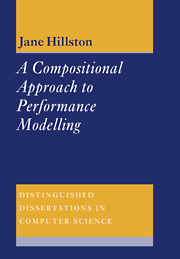Book contents
2 - Background
Published online by Cambridge University Press: 24 November 2009
Summary
Introduction
This chapter presents the background material for the thesis. The field of performance modelling is introduced and the standard paradigms for specifying stochastic performance models, queueing networks and stochastic Petri nets, are reviewed. In Section 2.3 process algebras are introduced, and some of the extensions into timed and probabilistic processes are considered in the following subsections. In particular we describe the Calculus of Communicating Systems (CCS), and various extended calculi based upon it.
We present the motivation for applying process algebras to performance modelling in Section 2.4. This outlines the objectives of the work presented in the remainder of the thesis. Finally, in Section 2.5, some related work, involving process algebras and performance evaluation, is discussed.
Performance Modelling
Performance evaluation is concerned with the description, analysis and optimisation of the dynamic behaviour of computer and communication systems. This involves the investigation of the flow of data, and control information, within and between components of a system. The aim is to understand the behaviour of the system and identify the aspects of the system which are sensitive from a performance point of view.
In performance modelling an abstract representation, or model, of the system is used to capture the essential characteristics of the system so that its performance can be reproduced. A performance study will address some objective, usually investigating several alternatives— these are represented by values given to the parameters of the model.
- Type
- Chapter
- Information
- A Compositional Approach to Performance Modelling , pp. 5 - 16Publisher: Cambridge University PressPrint publication year: 1996

